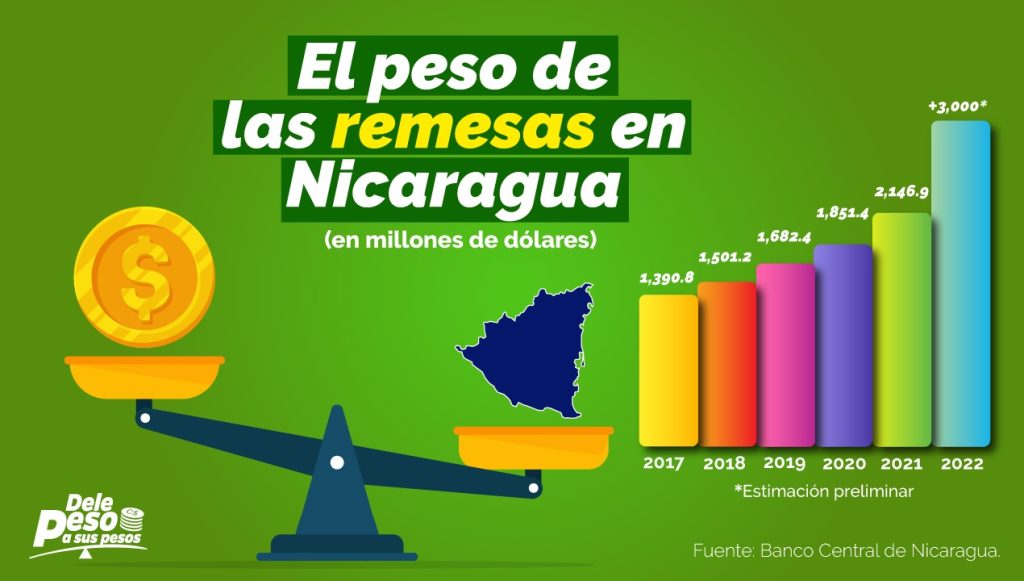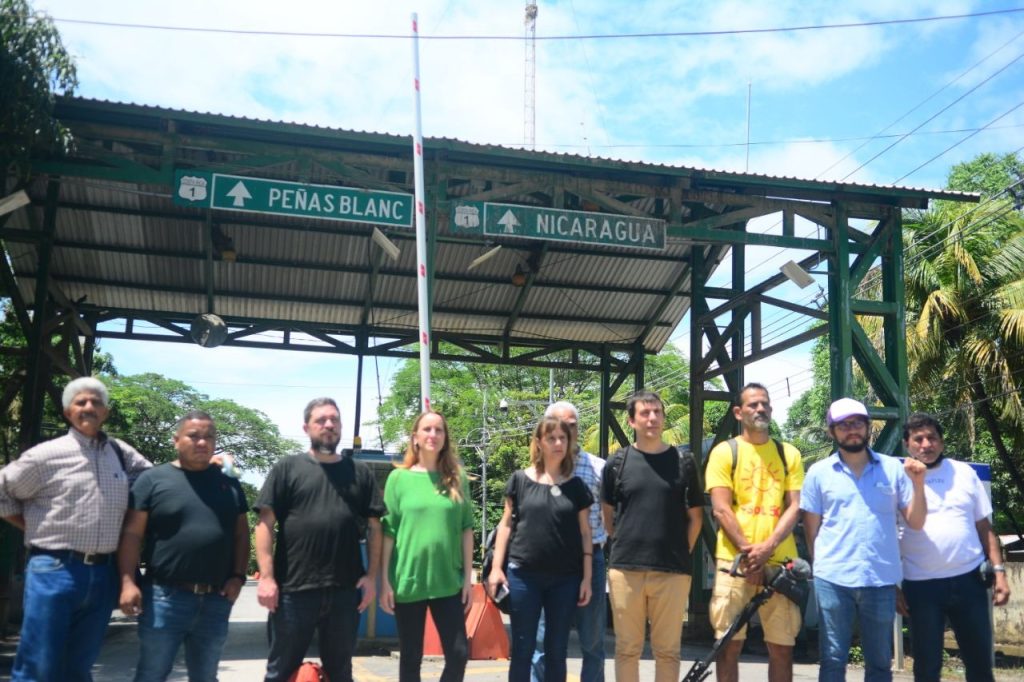La situación en el país atraviesa una coyuntura de nueva ofensiva represiva de la dictadura. Otra vez hay un salto en el número de personas presas por razones políticas. El fenómeno del exilio y las remesas. El doble discurso de Ortega-Murillo. La necesidad de retomar la iniciativa internacional.
Alternativa Anticapitalista (LIS – Nicaragua)
Nicaragua atraviesa una contradicción aguda: se consolidó una tiranía política y salvo episodios de resistencia aislada, muy localizada, hay un reflujo general en la población después de la derrota pos-abril de 2018. La dictadura no dudó desde entonces: suprimió todo derecho democrático en el país, desarticuló el entramado de colectivos, organizaciones sociales de DDHH, feministas, campesinas, estudiantiles y de todo tipo que articulaban de forma transversal activismo comprometido. Miles de personerías suprimidas, expropiación de sedes, expatriación de referentes y persecución de liderazgos. Hay que sumar la anulación de toda prensa libre e independiente, con decenas de periodistas y jóvenes investigadores en el exilio forzado.
La última escalada viene siendo sobre las universidades privadas, y en especial la cancelación de la UCA de gestión jesuítica, con cárcel a dirigentes estudiantiles jóvenes y medidas de sanción económica, terminó de redondear una nueva fase de represión interna.
Ortega y Murillo, apoyados en el monopolio de la fuerza represiva, en el desmantelamiento de toda oposición interna con capacidad de movilización, viene logrando el objetivo de maniatar al pueblo nica y en todo caso, como explicó Humberto Ortega, hermano del tirano gobernante, preparar las condiciones para una transición pactada con sectores de la oposición empresarial ahora en el exilio, en condiciones de mantener negocios e impunidad para los crímenes cometidos. La figura de la “reconciliación y el diálogo nacional” reaparecen en esta estrategia. Lógicamente, el deterioro de la situación social y económica, las tensiones al interior del clan gobernante y eventualmente, la multiplicación de acciones “relámpago” (de las que sabemos que hubo algunas expresiones puntuales), van a marcar el ritmo de la situación interna del país.
La política del éxodo, el negocio de las remesas y el doble discurso.
Según un informe del Banco Central de Nicaragua hasta mayo pasado, las remesas procedentes de Estados Unidos crecían a un ritmo superior al 80% anual. El 75 % de los dólares que ingresaron por remesas familiares en 2022 tuvieron su origen en Estados Unidos, seguido de Costa Rica y España. Se trata de un flujo decisivo para la estructura del modelo económico capitalista de Ortega-Murillo: durante 2022, los ingresos por remesas familiares alcanzaron un total de 3.224 millones de dólares. Por lo tanto, se expresa la aparente paradoja de que la tiranía que despliega un discurso pretendidamente anti-imperialista, por otro lado, tiene en estos giros desde el exterior uno de sus principales sostenes económicos. Se calcula de hecho que, a finales de este año, las remesas familiares, proyectan un aumento de 5.000 millones de dólares. Esto significa, que la dependencia económica de las remesas será superior al 30% del PIB y un millón de hogares nicas recibirán dinero desde EEUU.

Habría que sumar, además, que las exportaciones a Estados Unidos representan el 35% del PBI del país siendo la mitad de la zona franca, de 130 empresas, 34 estadounidenses y más de 40 de capital nica.
Una combinación en pinza, y funcional para los dos polos de la relación:
*El imperialismo gringo, con sus empresas en la zona franca bajo el formato de maquilas, súper-explota en territorio nica, fuerza laboral de este país. Y a la vez, con población migrante en EEUU, súper-explota fuerza de trabajo en condiciones de precariedad, obligando a un ajuste de cinturones al mismo pueblo, para habilitar el envío de remesas y así quienes migran puedan ser sostén de sus familias desesperadas en Nicaragua, aunque cada vez con mayor dificultad.
*La tiranía, por su parte, promueve un exilio que le despeja el camino de toda protesta o potencial reacción social, y a la vez, recibe un ingreso económico que compensa la matriz de capitalismo subordinado, decadente y empobrecedor de su pueblo (no así de su clase burguesa oficial, que parasita desde el Estado enormes negocios, empezando por el clan Ortega-Murillo).
En resumen: antiimperialismo sobre-actuado, y negocios paralelos de parte de la dictadura. Relato sobre “democracia y DDHH” de parte de la Casa Blanca, que al final, mantiene un statu quo que le permite hacer negocios, que es lo que les importa, en definitiva.
La plataforma Monteverde: ¿qué oposición hace falta?
El panorama de repliegue social en el interior del país, tiene su contracara en la actividad de los distintos sectores de la oposición en el exilio. La última liberación, con expatriación incluida, de 222 presos políticos hace varios meses, reactivó un debate crucial: ¿qué oposición hace falta para enfrentar a la dictadura?
En ese contexto, el eje “unidad” ante una evidente fragmentación y repetidos fracasos, sobre todo, de la oposición más ligada a una fracción empresaria y con vínculos orgánicos con la Casa Blanca, reanimó la confluencia del llamado “Grupo Monteverde”. En ese espacio, coexisten algunos de los principales liderazgos que impulsaron en el contexto de la rebelión de abril de 2018 la política de “diálogo nacional”, que dividió la movilización callejera, desactivó parte de los tranques que tenían acorralada a la dictadura y cedió a una maniobra artera que Ortega-Murillo utilizaron para reprimir el activismo consecuente y desatar una represión a gran escala.
Esos mismos referentes, confiaron después, en un llamado a elecciones en condiciones fraudulentas y con presos en los calabozos de la tiranía, y también generaron una falsa expectativa, que derivó en frustración posterior ante la prohibición de todas las candidaturas opositoras por parte del régimen.
Entonces, lo que tenemos una vez más, con la iniciativa de “Monteverde” (nombre que alude al hotel en Costa Rica, donde se reunieron por primera vez) es una convergencia muy heterogénea de liderazgos político-empresarios, campesinos y sociales, incluso de referentes del partido Unamos que integran ex dirigentes sandinistas, que tributan a una política que ya fracasó: la unidad por la unidad, sin programa y estrategia de movilización internacional, y nacional para hostigar, acorralar a los tiranos e incentivar la moral popular en Nicaragua apostando a la reacción de un pueblo con larga tradición revolucionaria. La unidad que se requiere es para la movilización independiente de todo injerencismo de potencias imperialistas, y un programa claro, de exigencia de libertad a todos los presos y presas, y un llamado a la acción del pueblo nica para echar definitivamente a esa tiranía pro-capitalista, represora y verduga de su propia gente.
Retomar la iniciativa: el ejemplo de la Comisión Internacional
Hace poco más de un año, desde la Liga Internacional Socialista, junto a la Articulación de Movimientos Sociales, el PRT de Costa Rica, colectivos de familiares de presos y perseguidos, y otras organizaciones de izquierda latinoamericana, llevamos adelante la iniciativa de la “Comisión Internacional por la vida y la libertad de las y los presos políticos en Nicaragua”. Esa campaña, que incluyó una caravana a la frontera con Nicaragua desde Costa Rica, en desafío a la dictadura, con la exigencia de entrar al país para certificar las condiciones de encierro de las personas presas, tuvo una amplia repercusión regional, y colaboró con la presión que finalmente hizo, que el régimen liberara presos políticos. Esa acción audaz, con una campaña que recogió adhesiones entre algunos sectores de la izquierda anticapitalista y socialista, crítica de la tiranía orteguista, es el tipo de iniciativas que el internacionalismo militante tiene la obligación de retomar y sostener, para ser coherentes con la lucha justa de un pueblo que lo hace todo por luchar, pero tiene las manos atadas.
En ocasión de esa intervención, lamentablemente, sectores de la izquierda mundial se abstuvieron de participar de forma activa, otros lo hicieron débilmente, y el llamado progresismo latinoamericano, directamente, optó por desconocer una orientación democrática unitaria, aunque con delimitación de todo campo imperialista. Es hora, de volver a la carga. De retomar la iniciativa. No hay margen para ser indiferentes, porque Nicaragua, su pueblo luchador ahora rehén, nos necesita.





